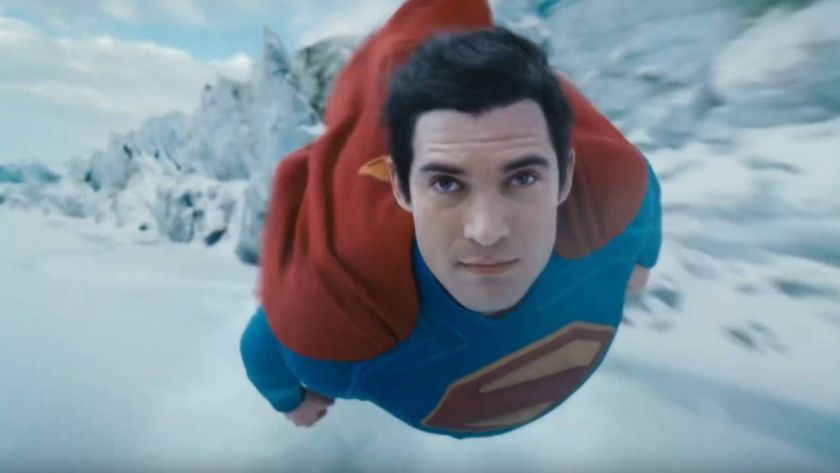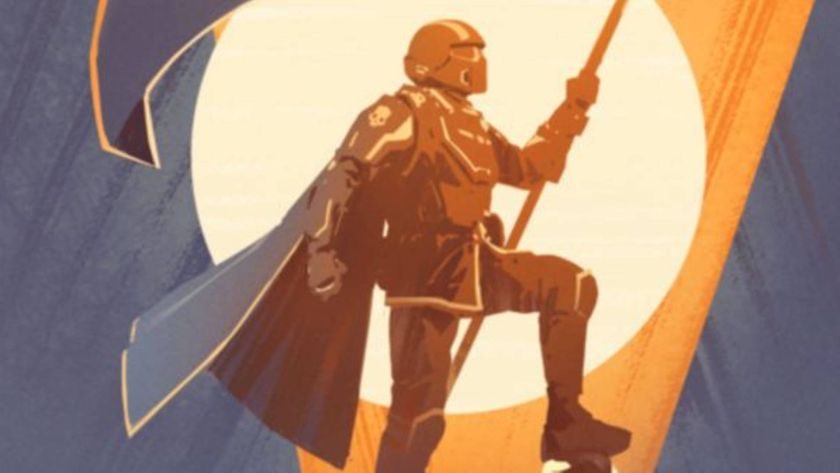Movies to watch this week at the cinema: Hacksaw Ridge, T2: Trainspotting, Christine, Sing, more...
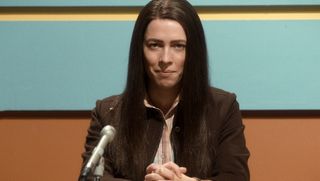
Out on Friday 27 January
Mel Gibson returns to the frontline with an anti-war movie. Danny Boyle gets the band back together. Rebecca Hall delivers a headline performance. Matthew McConaughey leads a pack of all-singing animals.
Yes, here's this week's new releases. Click on for our reviews of Hacksaw Ridge, T2: Trainspotting, Christine, Sing, Denial, Ghost in the Shell, The King, and Danny Says: The Life and Times of Danny Fields, and Cameraperson.
For the best movie reviews, subscribe to Total Film.
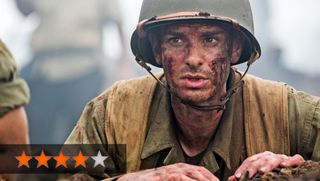
Hacksaw Ridge
In May 1945, in the hellfire battle of Okinawa, army medic and Seventh-day Adventist Desmond T. Doss battled to save 75 men’s lives without shooting anyone. In 2016, a troubled star/filmmaker looked to Doss to save his skin too.
Has Mel Gibson earned any reprieve for his grim off-screen rants? That’s not something one film will answer, but in telling Doss’ story, he re-asserts himself as a director to be reckoned with.
Whether you view Hacksaw Ridge as a controversial filmmaker’s apology, a redemption bid, or a startling, peacenik-slanted variant on the war movie, one thing is sure: between its religious themes (nothing ‘subtextual’ about Gibson’s up-front passions) and its trial by fire of a man’s faith, it burns with a bullish conviction that lends punch to its assaults on restraint.
True, clichés mount in the prologue, where the solemn score (by Rupert Gregson-Williams), slow-motion images and deep, meaningful (and vaguely Malick-ian) voiceover set the lay of the land. When the action flashes back a few years to Virginia, where Andrew Garfield’s Doss hits on Teresa Palmer’s nurse Dorothy with a cheesy line, her wry reply speaks volumes about Gibson’s near-hokey portrait of homeliness: “I never heard that one before. It’s pretty corny.”
But she dates him, anyway – and we’re reeled in too, thanks to the combined pull of our lead and his assured director and writers. Gibson and scribes Andrew Knight/Robert Schenkkan’s grip on familiar material is firm; their images, motifs and structural gambits lend purpose to potentially cheesy material.
Biblical themes resonate as a young Doss wallops his brother with a rock; his bullying dad (Hugo Weaving) whips him with a belt for his crime. Years on, Doss uses his own belt to help an injured man, his journey to redemption symbolically begun.
A godsend as Gibson’s peaceable pilgrim, Garfield imbues Doss’ gangly mannerisms and corn-fed dialogue with a winning mix of Gump-speak sweetness and self-certainty. That certainty is tested in the movie’s second act, a shift from home-baked heaven to the purgatory of military training.
Between Vince Vaughn’s shouty sergeant and the barracks bullies, we’ve been here before. But Vaughn is more engagingly inquisitive than other, more abusive genre types; and Doss’ comrades aren’t all brutes.
Most are just terrified of war and worried about fighting alongside Doss, who refuses to carry weapons but yearns to go to war and save lives. As Doss is court-martialled for his conscientious objections, the judgement sets up act three’s inferno: “You are free to run into the hellfire of battle without a single weapon to defend yourself,” he’s told/warned.
At which point, steel yourselves. After a barrage of bombing, Gibson leads us up a cliff and into a Bosch-ian nightmare. Between the mud, splayed bodies, bullet-pierced tin hats and torsos used as shields, the Battle of Okinawa pulverises. War has been hell in movies before; this is worse. Staged with grim relentlessness by Gibson, DoP Simon Duggan and sound man Robert Mackenzie, it makes Lone Survivor look like Home Alone.
When we don’t recognise the dead’s faces, it’s because rats are devouring them. But what impresses otherwise is how Gibson pushes his direction beyond the exploitative possibilities of raising hell. True, we don’t learn much about the enemy: problematically, they are, merely, “the Japanese”.
But the slow-burn promise of the film’s opening acts pays off in a fierce focus on characters we’ve come to know, played with panic-faced conviction by Sam Worthington, Luke Bracey and others. And it pays off in Doss’ actions.
Only ever using a rifle to mock up a stretcher, Doss resembles a man trying to stem Niagara Falls with a teacup on his returns to the field to save lives. “Please, Lord, help me get one more,” he begs. And he keeps trying, dodging death to drag the wounded from battle, dress injuries and winch them down a 400ft cliff with a makeshift pulley, staggering like a man drunk on righteous determination.
True, Gibson can’t be accused of subtlety. “What you did on that ridge is nothing short of a miracle,” Doss is told, lest we missed the religiously freighted images of watery dousings and holy ascensions. But the tensions between faith and fighting are properly seeded, then rammed home with an intense immediacy in the heat of battle.
Whether or not that’s enough to salve Gibson’s shaky reputation, Hacksaw’s heart-in-mouth climax asserts this much: he’s earned our belief in Desmond Doss’ astonishing story.
THE VERDICT: Gibson returns to film’s frontline with a ferociously felt anti-war movie, while Garfield invests his Doss with tremendous conviction.
Director: Mel Gibson; Starring: Andrew Garfield, Sam Worthington, Luke Bracey, Teresa Palmer, Hugo Weaving, Vince Vaughn; Theatrical release: January 27, 2017
Kevin Harley
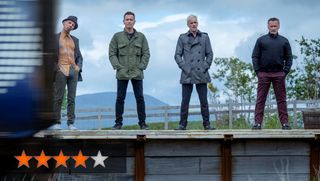
T2: Trainspotting
On paper it looks like a scam. The sort of take-the-money-and-run job that Renton (Ewan MacGregor) pulled before striding off into the freeze-framed future at the end of Danny Boyle’s 1996 era-defining masterpiece.
Get the gang – director Boyle, novelist Irvine Welsh, under-sung screenwriter John Hodge, producer Andrew MacDonald and a cast now more used to Hollywood than Holyrood – back together; loosely adapt another of Irvine Welsh’s scabrous junk epics (this time, Porno), and retire on the attendant millions to watch “mind-numbing, spirit-crushing game shows, stuffing fucking junk food into their mouths”. Or maybe not.
For 20 years, T2 was the elephant in the room, the madman laughing in the corner; the gang perhaps mindful of Sick Boy’s dictum: “You’ve got it, and then you lose it, and it’s gone forever.” But Boyle, for one, has never lost it, and every frame of this film means something to him, and those who were there the first time. Dizzyingly meta, maddeningly broad, then oddly moving, T2 takes some getting your head round, even for the faithful. Indeed, new viewers may wonder what’s been slipped in their drinks.
It begins, of course, with Renton’s sprinting feet. But they’re pounding a treadmill, rather than the Princes Street tarmac, and he can’t outrun the treachery of his past. A health scare – and worse – drags him back home to a Leith of steep decline and slow regeneration. Here, Sick Boy (Jonny Lee Miller) pimps out his girlfriend Veronika (Anjela Nedyalkova) for blackmail cash; Francis “Franco” Begbie (Robert Carlyle) is taking the messy route out of Saughton Prison; and Spud (Ewen Bremner) is still a junkie with the soul of a poet.
“You’re a tourist in your own youth,” Sick Boy tells Renton, after a much-deserved beating. “What other moments will you be revisiting?” As Renton, Sick Boy and Veronika cook up a new get-rich-quick scheme, the short answer is, practically all of them. Some are glorious – Spud freefalling into his old friend’s arms. Some disappoint – the ‘Choose Life’ speech needs no dissection. Some – such as when one character quotes Welsh’s original novel and another acts it out – are so postmodern, they pull you, thrillingly, down the wormhole to Malkovich-land.
Once more, Boyle’s direction is the star here. Busy with verbs, spiky with life, the film fizzes along to a fantastic soundtrack of new friends (Young Fathers) and remixed favourites (‘Born Slippy’). But it’s also slightly diffuse: without Renton’s acid voiceover, the narrative loses that monomaniacal focus, swapping the purity of the original high for a cocktail of different uppers and downers.
With Renton at the centre, everyone else was a (brilliantly realised) bit-part player in his story – the way we all feel when we’re young. With all four leads jostling for that centre, Renton becomes a blank, a silhouette, the everyman he always threatened to be. However, when he’s singing with Sick Boy (no really) and sprinting with Spud – or from Begbie – the film crackles with the old black magic. And of its many surprises, it saves the best for last. The neon-drenched final reckoning is heart-stopping; the final shot, simply heart-melting.
Trainspotting, you see, was never about the drugs, or the money. It was about youth, about escape. Twenty years on, with middle age encroaching and all hopes of escape long evaporated, T2 isn’t about the drugs, or the money either. It’s about chasing the old highs, realising you can’t reach them and then, if you’re lucky, finding new ones.
THE VERDICT Wiser, sadder but very much alive and kicking, T2 is a film that knows you can’t compete with the ghosts of the past. But at least you can dance with them.
Director: Danny Boyle; Starring: Ewan McGregor, Ewen Bremner, Jonny Lee Miller, Robert Carlyle; Theatrical release: January 27, 2017
Matt Glasby
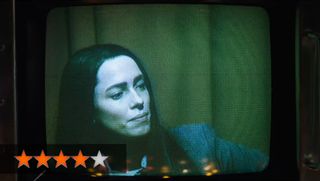
Christine
It’s more than four decades since Florida news reporter Christine Chubbuck tragically took her own life live on air. Curiously, in the last 12 months we’ve already had Kate Plays Christine, a documentary about an actress researching Chubbuck’s life and death.
Now comes this (far superior) biopic, a meticulously constructed psychological drama from Antonio Campos (Afterschool, Simon Killer) boasting a show-stopping turn from Londoner Rebecca Hall.
Intelligently scripted by producer/first-time writer Craig Shilowich, Campos’ film introduces Chubbuck as a loner who still lives with her mother (J. Smith-Cameron), has an unfulfilled yearning for a colleague (Michael C. Hall) and is sidelined by her boss (Tracy Letts) at the Sarasota TV network where she works. But that’s just scratching the surface of a complex, unsettled woman frequently trying to present different versions of herself to whoever enters her orbit.
Cinematography, costumes and design all contribute to a sickly ’70s palette reflecting Chubbuck’s increasingly fractured state of mind.
But it’s Rebecca Hall that arguably deserves the greatest praise; she practically devours her role in a way she’s rarely, if ever, been allowed to do on screen before. Expect to see her feature in this year’s awards-season conversation.
THE VERDICT: Deftly assembled and impressively performed, Campos’ film fully fleshes out the woman behind the newsdesk.
Director: Antonio Campos; Starring: Rebecca Hall, Michael C. Hall, Tracy Letts, Maria Dizzia; Theatrical release: January 27, 2017
James Mottram
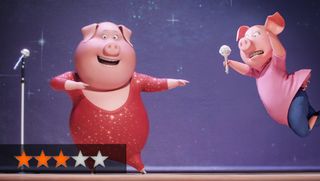
Sing
Son of Rambow director Garth Jennings plays it disappointingly safe with this entertaining but ultimately disposable ’toon about an all-animal singing comp.
Creature Comforts with music and an A-list cast (McConaughey, Witherspoon, Johansson), it’ll play best to undemanding youngsters. Jennings casts himself as Miss Crawly, a doddery lizard whose rogue eyeball practically steals the show.
Director: Garth Jennings; Starring: Matthew McConaughey, Reese Witherspoon, Seth MacFarlane, Scarlett Johansson, John C. Reilly, Taron Egerton; Theatrical release: January 27, 2017
Neil Smith
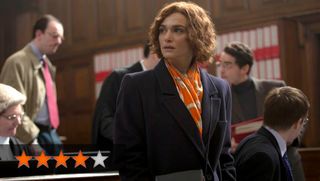
Denial
In 1996, Jewish-American historian Deborah Lipstadt (Rachel Weisz) was sued by British historian David Irving (Timothy Spall) for libel, claiming she’d smeared him as an anti-Semite.
Mick Jackson (The Bodyguard) mounts a gripping recreation of the court battle, though the film’s all but stolen by Spall, deploying a range of expressive snorts and pouts to rival his portrayal of J.M.W. Turner.
Director: Mick Jackson; Starring: Rachel Weisz, Tom Wilkinson, Timothy Spall, Andrew Scott; Theatrical release: January 27, 2017
Philip Kemp
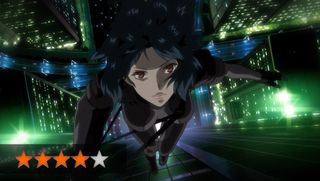
Ghost in the Shell
With the Scar-Jo remake imminent, what better time to revisit Mamoru Oshii’s iconic 1995 anime? A 2029-set tech-noir, in which Major Motoko Kusanagi (Atsuko Tanaka) hunts hacker Puppet Master, often opting to fight naked, as you do.
Most alluring are the crumbling neon cityscapes, real world/cyberspace fusion and the musings on identity.
Director: Mamoru Oshii; Starring: Atsuko Tanaka, Lemasa Kayumi; Theatrical release: January 25, 2017
Jamie Graham
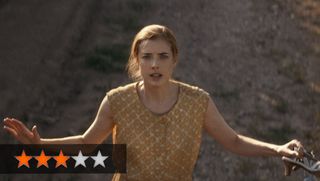
The White King
Young Djata (impressive first-timer Lorenzo Allchurch) lives in the Homeland, an agrarian-fascist state. His dad’s been hauled off by the police; his mother (Agyness Deyn) copes bravely.
Co-directors Alex Helfrecht and Jörg Tittel devise a convincingly scary dystopia crossing Nazi Germany with Stalin’s Russia. Too bad Helfrecht’s script lets it down, being episodic and, in its final stretch, inconclusive.
Directors: Alex Helfrecht, Jorg Tittell; Starring: Olivia Williams, Agyness Deyn, Jonathan Pryce; Theatrical release: January 27, 2017
Philip Kemp
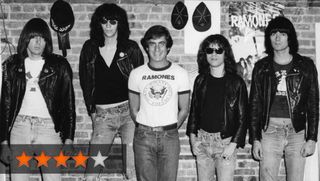
Danny Says: The Life and Times of Danny Fields
This engaging retro-doc makes a star of journalist/publicist/music exec Danny Fields, who went from hanging out at Warhol’s Factory to Beatles controversy (publishing Lennon’s “bigger than Jesus” quote) to cutting a record deal for Iggy and the Stooges.
Includes rare footage – like Lou Reed’s first listen to The Ramones. Muso heaven.
Director: Brendan Toller; Starring: Danny Fields, Iggy Pop, Alice Cooper; Theatrical release: January 28, 2017
James Mottram

Cameraperson
Veteran doc cinematographer Kirsten Johnson offers a rich tapestry of her work. Whether they’re a family returning to an ethnically cleansed area, a teenager in an Alabama health clinic, or a midwife in a rural Nigerian hospital, Johnson’s compassion shines through, while the images raise vital ethical questions about the responsibilities of the nonfiction filmmaker.
Director: Kirsten Johnson; Theatrical release: January 27, 2017
Tom Dawson
The Total Film team are made up of the finest minds in all of film journalism. They are: Editor Jane Crowther, Deputy Editor Matt Maytum, Reviews Ed Matthew Leyland, News Editor Jordan Farley, and Online Editor Emily Murray. Expect exclusive news, reviews, features, and more from the team behind the smarter movie magazine.

